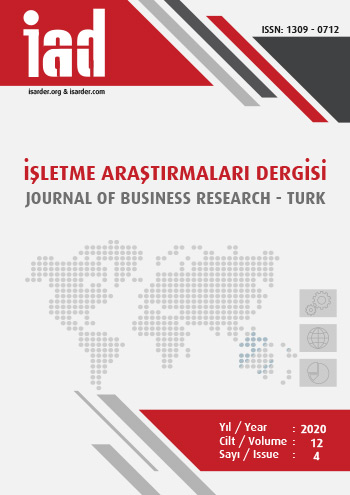İş Doyumunun Sanal Kaytarma Davranışı Üzerindeki Etkisi: Gaziantep İlinde Özel Sektörde Çalışanlar Üzerinde Bir Araştırma
The Effect of Job Satisfaction on Cyberloafing Behaviour: A Research on Private Sector Employees in Gaziantep
Author(s): Cafer Şafak Eyel, Alper TutcuSubject(s): Business Economy / Management, Organizational Psychology, Human Resources in Economy, ICT Information and Communications Technologies
Published by: Orhan Sağçolak
Keywords: Job Satisfaction; Cyberloafing: Searching; News Reading: Personal-related Works;
Summary/Abstract: Purpose – Internet has become an important part of daily life with the advances in technology. However, it was seen that employees started to display cyberloafing behaviour in workplace, as the result of using Internet’s becoming widespread and beginning to be used intensively in companies. There are lots of factors directing employees to display cyberloafing behaviour, and within the scope of this study, it was aimed to research whether or not there is effect of job satisfaction on cyberloafing behaviour. Design/methodology/approach – In this regard, a survey questionnaire was prepared, and conducted on 413 employees working at private sector in Gaziantep between 21st of April, 2019 and 17th of July, 2019. In order to measure job satisfaction of emloyees, job satisfaction scale with 5 items developed by Brayfield and Rothe (1951), shortened by Yoon and Thye (2002), and adapted into Turkish by Kuşluvan and Kuşluvan (2005) was used. Moreover, in order to measure cyberloafing behaviours of employees, cyberloafing behaviour scale with 23 items and 4 dimensions developed by Blanchard and Henle (2008), and adapted into Turkish by kalaycı (2010) was used. Gathered data was analysed via SPSS-22 program. In this regard, factor analysis, reliability analysis, regression analysis, Independent Samples T Test and ANOVA Test were used. Findings – As the result of factor analysis conducted for cyberloafing behaviour scale, there were determined 4 factors named as searching, personal-related works, socialization and news reading. Furthermore, as the result of hypothesis tests made in context to the main goal of the study, it was found that job satisfaction does not have significant effect on cyberloafing behaviour factors. Moreover, the finding that the responses given for cyberloafing behaviour factors and job satisfaction are different according to some demographical features of participants, was reached. Discussion – There was determined that the finding indicating there is no significant effect of job satisfaction on cyberloafing behaviour is not is parallel with the findings of previous studies in the literature. Moreover, the reason that job satisfaction does not have effect on cyberloafing behaviour was evaluated as the use of Internet’s to be perceived as a normal behaviour in both daily life and job life.
Journal: İşletme Araştırmaları Dergisi
- Issue Year: 12/2020
- Issue No: 4
- Page Range: 3596-3612
- Page Count: 17
- Language: Turkish

